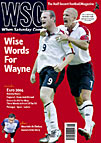 Spread-betting and exchanges gave David Bendelow a staggering range of gambling enticements over the last month. So many he even backed Pauleta for the Golden Boot
Spread-betting and exchanges gave David Bendelow a staggering range of gambling enticements over the last month. So many he even backed Pauleta for the Golden Boot
It wasn’t that long ago that my betting on a major championship would consist of a tenner on the outright winner and a few quid on the first scorer when England played. These would be placed after a leisurely stroll to the William Hill shop in Headingley.
Now, the degree of planning involved is akin to a moon landing. I am constantly scouring the internet for the latest news, have more than 20 different online fixed-odds accounts – a necessity if you want to get the best price – and also play the spreads and exchanges. The exchanges have revolutionised the way we bet as they allow us to play the role of bookie by laying an outcome. For example, it became fairly clear from the start that France were an accident waiting to happen so, thanks to the exchanges, I pressed the lay button on Betfair at 3.5 (5/2) during the group phase and collected £40 when they crashed out against Greece.
The exchanges also create the dream scenario of securing profits whatever the outcome. I had £25 on England at 12/1 after their defeat by France but laid them back at 5/1 for £35 ahead of their quarter-final. That meant if England won the tournament I would win £125 – my original bet (£25 x 12 = £300) minus the money I laid (£35 x 5 = £175). Or if they didn’t win, I’d lose my £25 but win £35 for the lay, hence a profit of £10.
But laying can be dangerous. My biggest loss of Euro 2004 came after laying the 2-2 draw between Denmark and Sweden. No way could the honest Scandinavians produce a stitch-up, I thought, so when the masses forced the odds down to 6/1 from 16/1 (market forces determine the price on Betfair), I couldn’t resist. I still think the score was a fluke, but instead of taking an easy tenner I was shelling out £70.
While my persistent dabbling on the exchanges produced a slight profit, I was a loser on the spreads. The basic premise of spread betting is that the more right you are the bigger the profit and the more wrong you are the bigger the loss. There are numerous markets on offer but my big weakness is buying player goal minutes. The spreads firms set a figure (for example, Ballack 17-20 minutes) and, like a share price, you either buy or sell. If you buy at 20 and Ballack fails to score (ie zero minutes) you lose 20 times your stake. Nasty. If he scores in exactly the 20th minute you break even. But – and this is what makes it so addictive – if he scores in the 69th minute you win 49 times your stake (69 minus 20). Goals in the 34th and 86th minutes and you’d win 100 times your stake.
Whenever friends saw me in a daze during Euro 2004, I was probably totting up how much a second-half Ashley Cole hat-trick would pay. Despite a juicy win on Jon Dahl Tomasson, I ended up a loser on this market due to my unshakeable belief in Luis Figo. I bought his goal minutes (in the mid-teens usually) in every single game and the past-it buffoon didn’t score once.
Greece’s win was a fantastic result for the bookies, although one lucky or inspired Betfair punter backed them at 500 (499/1). I backed Greece too – not to score a single goal in the tournament at 10/1. Oh dear.
But there was to be a happy ending. Being a Liverpool fan, I was acutely aware that Milan Baros had a far better scoring record for the Czechs than his club and, just as crucially, was fresh as a daisy and full of frustration after warming the bench for the last few months.
I wasn’t clever enough to have just backed Baros (I had five other Golden Boot punts, including Pauleta) but the 66/1 payout more than covered my other losses. The Baros replica shirt has already been purchased and “thank you” phone calls to Gérard Houllier and Emile Heskey may be in order too.
From WSC 210 August 2004. What was happening this month